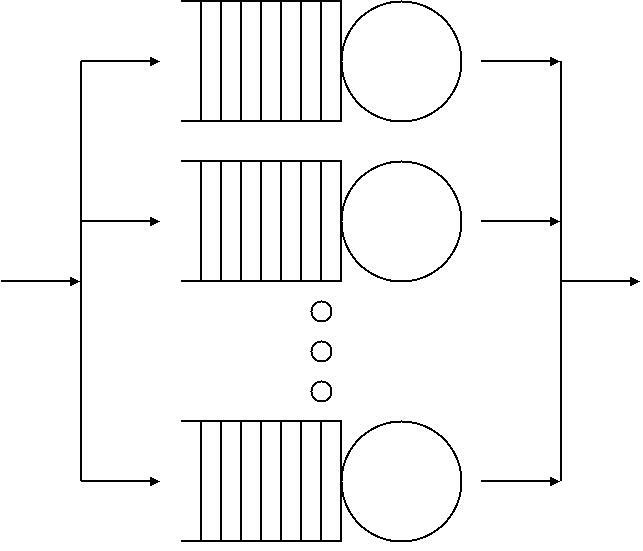|
Traffic Equations
In queueing theory, a discipline within the mathematical theory of probability, traffic equations are equations that describe the mean arrival rate of traffic, allowing the arrival rates at individual nodes to be determined. Mitrani notes "if the network is stable, the traffic equations are valid and can be solved." Jackson network In a Jackson network, the mean arrival rate \lambda_i at each node ''i'' in the network is given by the sum of ''external'' arrivals (that is, arrivals from outside the network directly placed onto node ''i'', if any), and ''internal'' arrivals from each of the other nodes on the network. If external arrivals at node ''i'' have rate \gamma_i, and the routing matrixAs explained in the Jackson network In queueing theory, a discipline within the mathematical theory of probability, a Jackson network (sometimes Jacksonian network) is a class of queueing network where the equilibrium distribution is particularly simple to compute as the network ha ... article ... [...More Info...] [...Related Items...] OR: [Wikipedia] [Google] [Baidu] |
Queueing Theory
Queueing theory is the mathematical study of waiting lines, or queues. A queueing model is constructed so that queue lengths and waiting time can be predicted. Queueing theory is generally considered a branch of operations research because the results are often used when making business decisions about the resources needed to provide a service. Queueing theory has its origins in research by Agner Krarup Erlang when he created models to describe the system of Copenhagen Telephone Exchange company, a Danish company. The ideas have since seen applications including telecommunication, traffic engineering, computing and, particularly in industrial engineering, in the design of factories, shops, offices and hospitals, as well as in project management. Spelling The spelling "queueing" over "queuing" is typically encountered in the academic research field. In fact, one of the flagship journals of the field is ''Queueing Systems''. Single queueing nodes A queue, or queueing no ... [...More Info...] [...Related Items...] OR: [Wikipedia] [Google] [Baidu] |
Probability Theory
Probability theory is the branch of mathematics concerned with probability. Although there are several different probability interpretations, probability theory treats the concept in a rigorous mathematical manner by expressing it through a set of axioms of probability, axioms. Typically these axioms formalise probability in terms of a probability space, which assigns a measure (mathematics), measure taking values between 0 and 1, termed the probability measure, to a set of outcomes called the sample space. Any specified subset of the sample space is called an event (probability theory), event. Central subjects in probability theory include discrete and continuous random variables, probability distributions, and stochastic processes (which provide mathematical abstractions of determinism, non-deterministic or uncertain processes or measured Quantity, quantities that may either be single occurrences or evolve over time in a random fashion). Although it is not possible to perfectly p ... [...More Info...] [...Related Items...] OR: [Wikipedia] [Google] [Baidu] |
Jackson Network
In queueing theory, a discipline within the mathematical theory of probability, a Jackson network (sometimes Jacksonian network) is a class of queueing network where the equilibrium distribution is particularly simple to compute as the network has a product-form solution. It was the first significant development in the theory of networks of queues, and generalising and applying the ideas of the theorem to search for similar product-form solutions in other networks has been the subject of much research, including ideas used in the development of the Internet. The networks were first identified by James R. Jackson A version from January 1963 is available at http://www.dtic.mil/dtic/tr/fulltext/u2/296776.pdf and his paper was re-printed in the journal '' Management Science’s'' ‘Ten Most Influential Titles of Management Sciences First Fifty Years.’ Jackson was inspired by the work of Burke and Reich, though Jean Walrand notes "product-form results … rea much less immedi ... [...More Info...] [...Related Items...] OR: [Wikipedia] [Google] [Baidu] |
Gordon–Newell Theorem
In queueing theory, a discipline within the mathematical theory of probability, the Gordon–Newell theorem is an extension of Jackson's theorem from open queueing networks to closed queueing networks of exponential servers where customers cannot leave the network. Jackson's theorem cannot be applied to closed networks because the queue length at a node in the closed network is limited by the population of the network. The Gordon–Newell theorem calculates the open network solution and then eliminates the infeasible states by renormalizing the probabilities. Calculation of the normalizing constant makes the treatment more awkward as the whole state space must be enumerated. Buzen's algorithm or mean value analysis can be used to calculate the normalizing constant more efficiently. Definition of a Gordon–Newell network A network of ''m'' interconnected queues is known as a Gordon–Newell network or closed Jackson network if it meets the following conditions: # the network i ... [...More Info...] [...Related Items...] OR: [Wikipedia] [Google] [Baidu] |

.png)